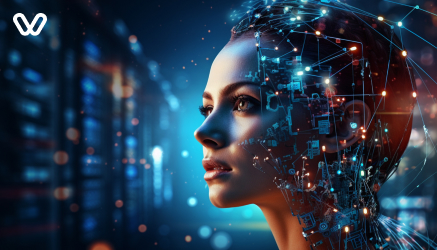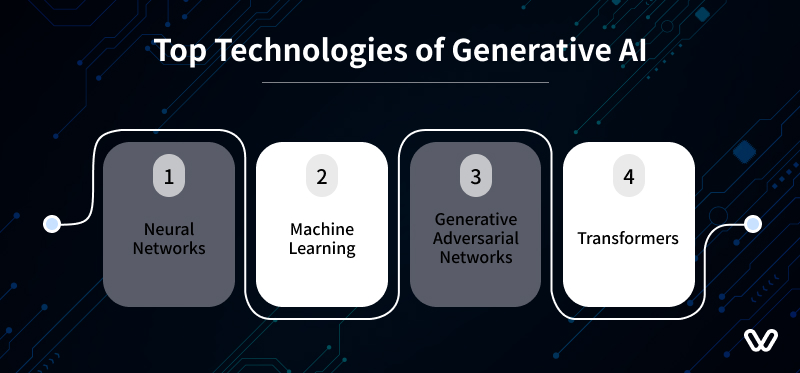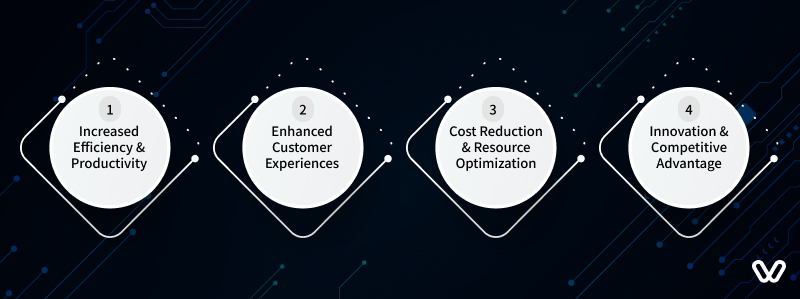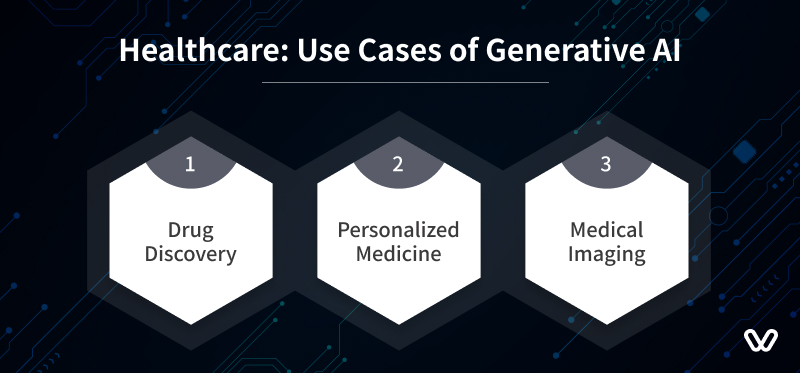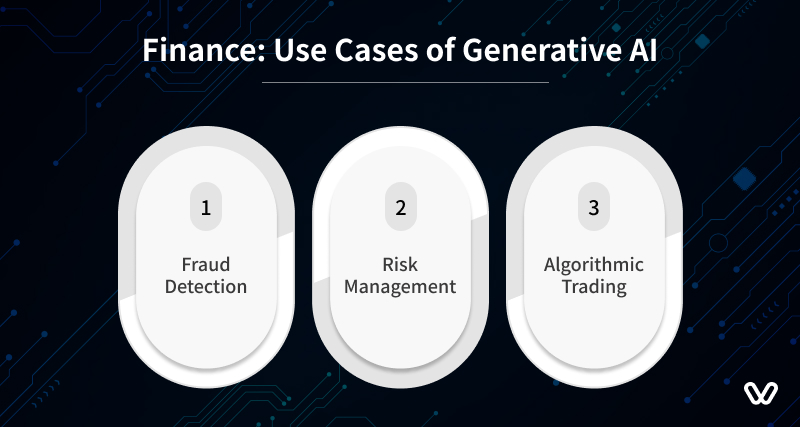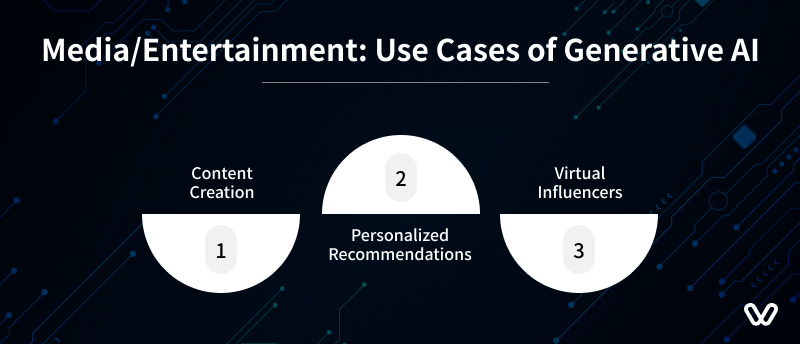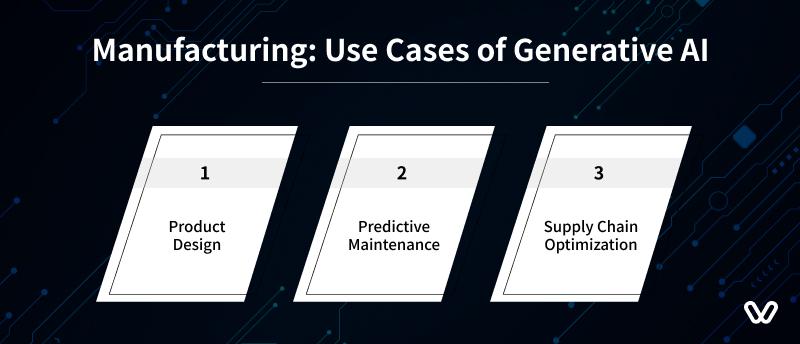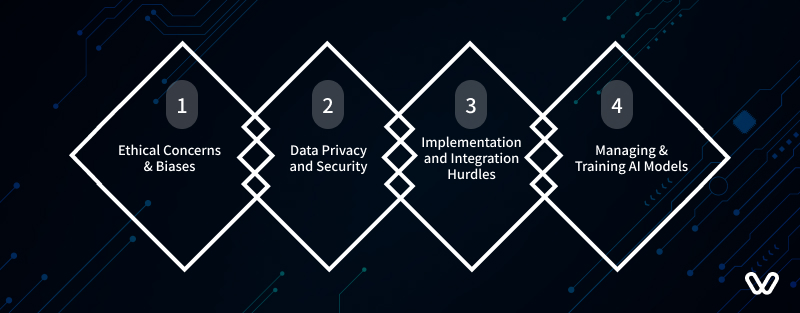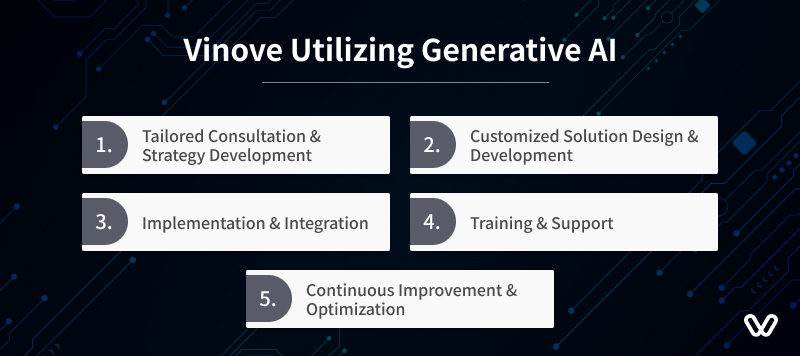Generative AI is revolutionizing how businesses operate & innovate in today’s fast-paced digital world. Generative AI, the future of Artificial intelligence, creates new content and ideas from existing data, is quickly becoming an essential tool for forward-thinking companies.
From making personalized customer experiences to streamlining complex processes, leading companies across various industries are harnessing the power of Generative AI to stay ahead of the curve.
So, join us as you will find the top ways leading businesses are utilizing Generative AI to drive success, redefine possibilities, and set new standards in their respective fields.
What Is Generative AI?
Generative AI is a subset of Artificial Intelligence focused on creating new content, viz. text, images, and sounds, by learning from existing data. It distinguishes itself from traditional AI by its ability to generate original, creative outputs rather than analyzing & predicting from data.
The technologies behind Generative AI in business include:
Neural Networks
- The backbone of generative AI, neural networks are designed to simulate the way the human brain processes information.
- Deep learning, a type of neural network, is particularly crucial for generative tasks.
Machine Learning
- Machine learning algorithms enable generative AI to learn patterns from large datasets.
- These algorithms improve over time as they are exposed to more data, enhancing the quality of the generated content.
Generative Adversarial Networks
- GANs consist of two neural networks i.e. the generator, which creates new data, and the discriminator, which evaluates the data’s authenticity.
- The generator and discriminator work together in a feedback loop, continuously improving the quality of the generated content.
Transformers
- Transformers are a type of model particularly effective for language-related tasks.
- They process data sequences to generate contextually relevant and coherent text, making them ideal for applications like chatbots and automated content generation.
Examples of Generative AI Models
Here we have listed some examples of Generative AI models and how businesses impact with Generative AI.
GPT-4
- An advanced language model capable of generating human-like text.
- Used for applications such as writing assistance, chatbots, and content creation.
DALL-E
- A model that generates images from textual descriptions.
- Demonstrates the ability of AI to create detailed and imaginative visual content from simple text prompts.
Other Notable Models
- StyleGAN: Used for creating high-quality, realistic images, such as human faces that do not exist in reality.
- MusicLM: A model designed to generate music from textual descriptions, showcasing the versatility of Generative AI in business.
Benefits of Generative AI in Business
Generative AI is revolutionizing the business landscape by offering numerous advantages. Here is a closer look at how Generative AI in businesses is providing benefits:
1. Increased Efficiency & Productivity
Generative AI in business automates repetitive and time-consuming tasks, allowing employees to focus on higher-value activities.
- By generating content, designs, and even code, generative AI speeds up various business processes, leading to faster project completion.
- This automation not only saves time but also reduces human error, ensuring more consistent and reliable outcomes.
2. Enhanced Customer Experiences
With the ability to analyze vast amounts of data, generative AI can create personalized content and recommendations for customers.
- AI-driven chatbots and virtual assistants provide instant, 24/7 customer support, enhancing satisfaction and loyalty.
- By tailoring interactions to individual preferences, businesses can create more engaging and meaningful customer experiences.
3. Cost Reduction & Resource Optimization
Generative AI, the future of Artificial intelligence, helps businesses cut costs by automating tasks that would otherwise require significant manual labor.
- It optimizes resource allocation by identifying the most efficient ways to use materials, time, and personnel.
- AI-driven predictive analytics can anticipate market trends and consumer behavior, enabling better inventory management and reducing waste.
4. Innovation & Competitive Advantage
Generative AI in business fosters innovation by enabling the creation of new products, services, and business models.
- Businesses that leverage Generative AI can stay ahead of the competition by rapidly adapting to market changes and consumer demands.
- The unique insights and capabilities provided by AI can uncover new opportunities/jobs for Generative AI and differentiation in the market.
Case Studies of Leading Businesses
Have a look at the following examples of leading businesses utilizing generative AI.
1. Healthcare
A leading pharmaceutical company has harnessed the power of Generative AI to transform its drug development pipeline. By integrating AI in software development process, the company can rapidly generate and test new compounds.
Generative AI Enterprise Use Cases:
- Drug Discovery: AI algorithms can analyze vast datasets of chemical compounds and predict their efficacy, ultimately reducing the time & cost.
- Personalized Medicine: By analyzing a patient’s genetic information, lifestyle, and medical history, Generative AI in business can create personalized treatment plans
- Medical Imaging: AI algorithms can identify patterns and anomalies in imaging data that might be missed by the human eye, leading to earlier and more accurate diagnoses.
2. Finance
A well-known bank has implemented generative AI to enhance its fraud prevention measures. By using generative AI, the bank can analyze millions of transactions in real-time to detect unusual patterns and behaviors that may indicate fraudulent activity.
Generative AI Enterprise Use Cases:
- Fraud Detection: By analyzing transaction patterns and detecting anomalies, AI systems can flag potentially fraudulent activities before they cause significant harm.
- Risk Management: Generative AI predicts potential risks by analyzing market trends, historical data, and various economic indicators.
- Algorithmic Trading: Generative AI in business enhances algorithmic trading by developing sophisticated trading algorithms that can analyze vast amounts of market data at high speeds.
3. Retail and E-commerce
One of the world’s leading e-commerce giants has successfully implemented generative AI to transform its customer experience. The company uses AI-driven chatbots to handle millions of customer interactions daily. These chatbots understand and respond to complex queries, thus, providing customers with quick & accurate solutions.
Generative AI Enterprise Use Cases:
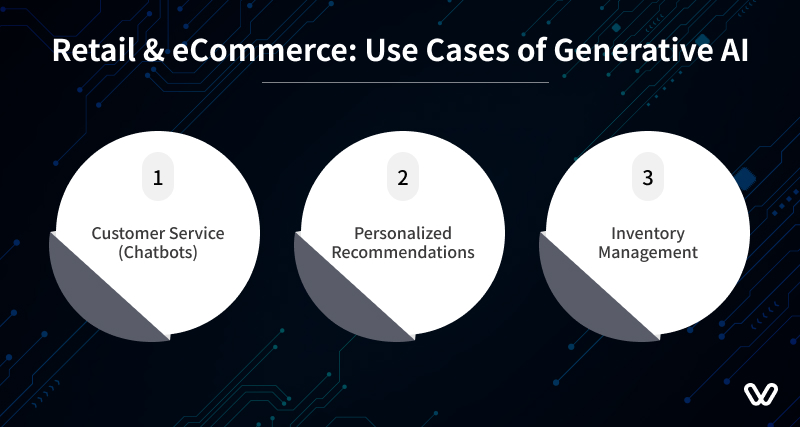
- Customer Service (Chatbots): Generative AI-powered chatbots provide instant, 24/7 customer support, significantly enhancing the customer service experience.
- Personalized Recommendations: By analyzing customer behavior and preferences, Generative AI can deliver highly personalized product recommendations. This not only improves the shopping experience but also increases sales.
- Inventory Management: Generative AI in business optimizes inventory management by predicting demand and ensuring that the right products are available at the right time. AI algorithms forecast trends, manage stock levels, and reduce overstock and stockouts.
4. Media & Entertainment
A prominent media company has successfully harnessed the power of Generative AI in business to enhance its content production capabilities. By integrating AI into their creative processes, the company can quickly generate compelling articles, videos, and social media posts that capture the audience’s interest.
Generative AI Enterprise Use Cases:
- Content Creation: Generative AI is revolutionizing content creation by enabling the rapid production of high-quality articles, videos, and music. AI can generate scripts, design graphics, and even compose music, allowing media companies to produce engaging content at scale.
- Personalized Advertising: In the competitive world of media and entertainment, personalized advertising is key to capturing audience attention. Generative AI in business analyzes user data to create highly targeted ads that resonate with individual preferences and behaviors.
- Virtual Influencers: Virtual influencers, created using generative AI, are becoming increasingly popular. These AI-generated personas can interact with audiences on social media, endorse products, and create content just like human influencers.
5. Manufacturing
A leading automotive manufacturer has leveraged generative AI to revolutionize its vehicle design process. By integrating AI into their design workflow, the company can explore a broader range of design possibilities and optimize each component for performance and efficiency.
Generative AI Enterprise Use Cases:
- Product Design: AI algorithms can generate multiple design iterations based on specific parameters, helping engineers and designers explore a wider range of possibilities and optimize products for performance, cost, and sustainability.
- Predictive Maintenance: In manufacturing, maintaining equipment uptime is crucial. Generative AI in business helps predict when machinery and equipment are likely to fail by analyzing data from sensors and historical maintenance records.
- Supply Chain Optimization: AI algorithms can analyze vast amounts of data from various sources to forecast demand trends, ensuring that manufacturers have the right materials and products at the right time.
Challenges & Considerations
As businesses increasingly adopt Generative AI, they encounter several challenges and considerations that need to be addressed to ensure successful implementation. Here are some key issues involved in transforming business with Generative AI:
1. Ethical Concerns & Biases
Generative AI in business has the potential to be misused, such as creating deepfakes or generating misleading information. It ensures that AI-generated content is used responsibly and ethically is a major challenge.
- AI models can inadvertently perpetuate existing biases present in the training data.
- This leads to unfair or discriminatory outcomes, particularly in areas like hiring, lending, and law enforcement.
- Addressing biases requires continuous monitoring and the implementation of strategies to mitigate their impact.
2. Data Privacy and Security
Generative AI systems often require large amounts of data to function effectively, raising concerns about data privacy. It ensures that personal & sensitive data is protected and used in compliance with privacy regulations is crucial.
- Protecting AI systems from cyber threats is essential, as vulnerabilities can lead to data breaches and misuse of AI-generated outputs.
- Implementing robust security measures to safeguard AI models and the data they use is a critical consideration.
3. Implementation and Integration Hurdles
Implementing generative AI involves complex technical challenges, including the need for specialized knowledge and expertise. However, integrating AI into existing systems can be difficult and time-consuming.
- The initial investment required for AI infrastructure, training, and deployment can be substantial.
- Small and medium-sized enterprises may find it challenging to allocate sufficient resources for AI adoption.
4. Managing & Training AI Models
AI models require ongoing training with fresh data to remain effective and accurate. This continuous learning process can be resource-intensive and requires regular updates.
- Ensuring the quality and reliability of AI-generated outputs is crucial.
- Businesses need to implement rigorous testing and validation procedures to maintain high standards.
- Despite advancements in AI, human oversight is essential to monitor AI systems and intervene when necessary.
- Balancing automation with human intervention ensures that AI systems operate ethically and effectively.
How Vinove Helps Its Clients in Utilizing Generative AI?
At Vinove, we are committed to empowering our clients with cutting-edge technologies like Generative AI to drive innovation and achieve their business objectives. Here’s how we assist our clients in leveraging Generative AI for their projects:
1. Tailored Consultation & Strategy Development
We collaborate closely with stakeholders to develop a tailored strategy that aligns with their objectives and ensures a clear roadmap for implementation.
2. Customized Solution Design & Development
Whether it is for enhancing content creation, optimizing processes through automation, or improving customer engagement with personalized experiences, we create solutions that deliver measurable results.
3. Implementation & Integration
Our technical team handles complexities such as data integration, system compatibility, and scalability to ensure a smooth deployment. We prioritize minimal disruption to ongoing operations while maximizing the benefits of AI adoption.
4. Training & Support
Our training sessions cover AI fundamentals, best practices for implementation, and ongoing support to ensure proficiency and confidence in using AI-powered solutions.
5. Continuous Improvement & Optimization
Through iterative improvements and proactive maintenance, we ensure that our clients derive maximum value from their investment in Generative AI over the long term.
Future Trends & Predictions
Generative AI in business is rapidly evolving and shaping the future of business across various industries. Have a look at the emerging technologies and predictions for the future:
1. Blockchain and AI
- Blockchain technology can enhance the transparency and security of AI-generated content and transactions.
- Combining blockchain with AI can create decentralized AI networks, ensuring data privacy and reducing the risk of tampering or manipulation.
2. 5G and Edge Computing
- The rollout of 5G networks and advancements in edge computing will enable faster data processing and lower latency.
- This will support real-time AI applications, including autonomous vehicles, remote surgery, and smart city infrastructure.
3. Quantum Computing
- Quantum computing promises to exponentially increase the speed and processing power of AI algorithms.
- Quantum AI could revolutionize industries by solving complex problems that are currently impractical for classical computers.
Predictions for the Future of AI in Business
Have a look at the following predictions for the future of AI in businesses worldwide:
1. AI-Powered Personalization
- Businesses will increasingly use AI to deliver hyper-personalized customer experiences.
- AI will analyze vast amounts of data to predict customer preferences and behavior, enabling customized products and services.
2. AI in Decision-Making
- AI will play a crucial role in business decision-making processes.
- Advanced analytics and predictive modeling will help businesses optimize operations, improve efficiency, and reduce costs.
3. Ethical AI and Regulation
- There will be increased focus on ethical AI practices and regulations to ensure fairness, transparency, and accountability.
- Businesses will need to adopt ethical guidelines and practices to mitigate risks and build trust with consumers.
4. Collaboration of Humans and AI
- The future will see more collaboration between humans and AI, with AI handling routine tasks and humans focusing on creativity, innovation, and strategic decision-making.
- This symbiotic relationship will drive productivity and innovation across industries.
Final Words
So far, you have seen the evolution of AI and thus, impact of Generative AI across various sectors, it is clear that this technology is not just a fleeting trend but a cornerstone of future business innovation.
Leading companies are already reaping the benefits, from enhancing customer engagement to optimizing operations. The journey of integrating Generative AI in business is filled with challenges, but the rewards are profound.
As you consider the potential of Generative AI for your own business, remember that staying ahead requires not just adopting new technologies but also fostering a culture of continuous learning and adaptation.
What are you waiting for?
Join our employee learning and development in AI if you want to take your business to new heights of success. Connect with our tech experts today at Vinove.
